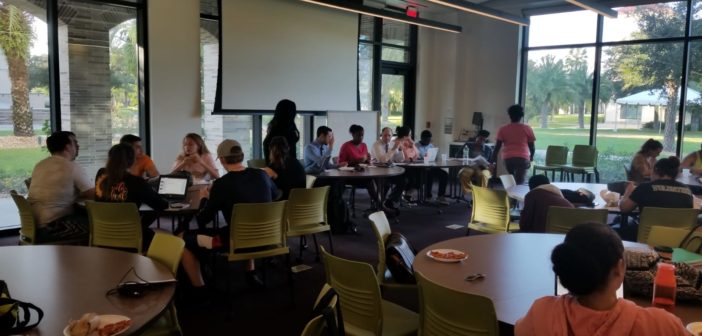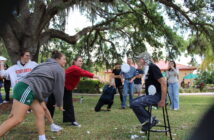On Oct. 16, an event was held on campus with a panel discussion of the Florida Amendments that are being voted for in the midterm elections. The panelists included three faculty members from the Political Science and Criminal Justice fields, two students from Pi Sigma Alpha (The Political Science Honors Society) and a guest speaker from the American Civil Liberties Union (ACLU).
The first point for the discussion was Amendment 4. Devan Cheaves, the regional director from American Civil Liberties Union’s Tampa office, was the first panelist to speak opening up with an explanation of the 4th Amendment.
“Amendment 4 is the voter restoration amendment; if it passes it will restore the ability to vote to nearly 1.4 million Floridians who have had a past felony conviction but has since served their time. So, this amendment will apply to people who have finished the terms of their sentences, be that probation, parole, community service, restitution fines, whatever, so, they have completed all of the terms of their sentence. And also, it excludes people who committed murder or sexual felony offenses, which is a pretty small category,” said Cheaves.
Cheaves added that convicted felons have more rights than just voting taken away from them. Panelist, professor of Criminal Justice Dr. Moneque Walker-Pickett, expanded on this concept as well.
“When a person’s been convicted of a felony, their rights are actually taken away,” said Walker-Pickett. “That includes the right to vote, the right to serve on a jury, the right to serve in public office, the right to actually own or use a firearm. Those rights are taken away.”
Walker-Pickett mentioned that in Florida, a convicted felon has these civil rights restored through a clemency board. One of the student panelist, Quiwanaki Ramsey, a sophomore majoring in political science, was the first to talk about the clemency board that Rick Scott established. Since 2007, former felons were able to have their rights restored under an automatic process that was established by former Governor Charlie Crist; however, this process was undone by Scott in 2011 in favor of the clemency board.
Walker-Pickett added to Ramsey’s point and mentioned that the process of going in front of a clemency board is rather cumbersome.
“In terms of the process of going in front of a clemency board, a person would need to have all of their time served, their parole or if a person is on probation or if a person has to pay restitution. You have to wait until five years after your sentence and all the other conditions have been completed, and for certain more serious crimes, not including murder or sexual offenses, you have to wait seven years. Now, the board only meets four times a year, and when you go in front of the board in addition to your application, you only get five minutes to speak.”
She also said that for persons that are denied restoration of their rights, they have to wait another two years to apply again.
Another faculty member panelist was instructor of Political Science Mr. Frank Orlando, and he focused more on political implementations of amendments. He mentioned that excluding those convicted of sexual offenders and murder from the amendment, although they may have paid their debts of society, is more “politically expedient.” This is because “allowing everyone to get their rights would make this much harder for the amendment to pass.”
Professor of Criminal Justice, Dr. David Persky, another panelist, added more about the automatic process that was established by Crist. Persky mentioned that 155,000 felons were restored their rights under this process; and for those who were restored these rights under this system, the reoffending rate was relatively low.
“The system’s working. This is an opportunity to fully integrate these former felons into society, let them be more productive, let them feel a part of the community. There is a lot of things that they experience as citizens and they may have opinions on as members of the community but if they aren’t allowed to vote, they really don’t have a full voice in what’s going on with their community,” said Persky.
Walker-Pickett also talked about studies that support the idea that there is a negative correlation between civic engagement and the recidivism rate, which refers to the rate of repeat offending.
“There is a correlation that when people are engaged civically, that means getting out and voting, being active in their communities, being active politically – that the recidivism rate or the reoffending rates are lower in [those]communities,” said Walker-Pickett.
The panel discussed that under the current system of going to the clemency board about 30,000 felons applied but roughly 3,000 were granted restoration of their rates, which is much lower than the number of felons being restored rights under the automatic system.
Orlando also addressed a question brought up by the moderator regarding people aligned with a particular political party voting a certain way for the Amendment to attempt to produce a better outcome for their respective parties for future elections. Orlando responded on this by saying that some people may argue that voting for the Amendment would help their party win for future elections. He mentioned that it is not wise to push the Amendment as being beneficial to one party over the other because a lot of people will vote it down if it is connected with the opposing party even if they feel that the content in the amendment is fair.
“Remember for this constitutional amendment to pass, it needs 60 percent; so, you need Republicans and Democrats to be in favor of this if you want this Amendment to pass. If you have couched this Amendment in terms of this [it]will help Democrats win more elections. That’s a bad way to sell this Amendment because you’re automatically going to make a lot of people vote against the Amendment,” said Orlando.
He added that there is a misconception that there are a lot of felons leaning towards voting for one party and are willing to vote in the next election if the Amendment is passed.
“The other thing is one and half million is a big number, but it’s not necessarily clear how many of these people will vote just like in any election. In a midterm election, we are only going to get 30 or 40 percent of people who are able to vote, voting,” said Orlando. “Even further, I think that it’s probably also wrong to think that they are going to vote in a uniform direction. It is not as though there is just a cash of 1.5 million democratic felons. There are a lot of probably Republican felons that are rearing to vote as well. So, will it probably help Democrats? At the margin, maybe.”
The panelists answered questions from students during the event as well. One of the students who asked questions was Paige Swanson, a member of the E-Board of the Political Honors Society. She asked about various questions during the event: one about criminals who are repeating offenses but striving toward rehabilitation. This gave the two students on the panel, Ramsey and Rose Foley, who is also a sophomore majoring in political science, an opportunity to chime in, along with the other members of the panel.
Along with discussing Amendment 4, the panel also touched on Amendment 6, which is a bundled amendment that includes content regarding Marcy’s law. Cheaves was first to speak on this as well, and she introduced the logistics of this amendment.
“A number of these amendments that are appearing on the ballot this year came through a process called CRC or Constitution Revision Commission. Amendment 6 is one of them. It’s a bundled amendment and by bundled that means there are two or three parts that are stuck together that really make no sense. So, three parts of that that are a part of Amendment 6 is Marcy’s Law; so, expanding victims’ rights to include financial crimes and also corporations,” said Cheaves. “The second portion of Amendment 6 is dealing with raising the retirement age from 70 to 75 for judges. There are some states in the United States where you can be 90. The last portion of Amendment 6 deals with judges relying on state agencies and institutions to determine or interpret the law for them. So, it is encouraged for them to interpret the law for themselves.”
Cheaves mentioned that her organization, ACLU, disproves of Amendment 6 because it doesn’t give equal rights to the accused, by restricting the time frame to prepare for defense and by eliminating the due-process for accused which ensures that the accused has access to a fair trial. She added that ACLU supports victims’ rights but this Amendment doesn’t provide any services to help sexual assault or domestic abuse victims, but it instead gives corporations who may be victims of crimes, such as shoplifting, the power in what the accused punishment is.
Similar to Amendment 6, Amendment 11 is also bundled. Amendment 11 is focused on high-speed rails in Florida, repealing the state’s ability to prohibit noncitizens from buying or owning property, persecuting criminal under the law they were originally charged under. However, the problem discussed by panelists is that the bundling of amendments can divide voters, with some voters being in favor of parts rather than the whole. Orlando commented specifically on the Marcy’s law being bundled together with the other issues in Amendment 6.
“Overall, I think it goes back to this issue of putting together all of these amendments. Maybe this might be an issue that this is something that we should handle one on one, right? But the idea that if I have to be for this, I also have to be in favor of raising the judges’ [retirement]age to 75,” said Orlando. “It makes no sense, right? What if you are on one side of an issue and the other side for the other issue.”
Orlando also talked about how getting an amendment on the constitution would make it extremely difficult to get the amendment off the constitution later on or changed later, and he mentioned that this brings up a bigger issue: “do we trust voters enough to be swayed by a big lobby campaign or a big advertising campaign?”
Orlando talked about campaigning and the presentation of amendments being influential and being able to sway voters. He also added that voters might become tired near the end of voting for the amendments, read the content improperly and may not make an informed voting decision.
Consequently, there are numerous factors and nuances that impact the voting for amendments. Therefore, it is advisable that voters educate themselves on each of the amendments.





